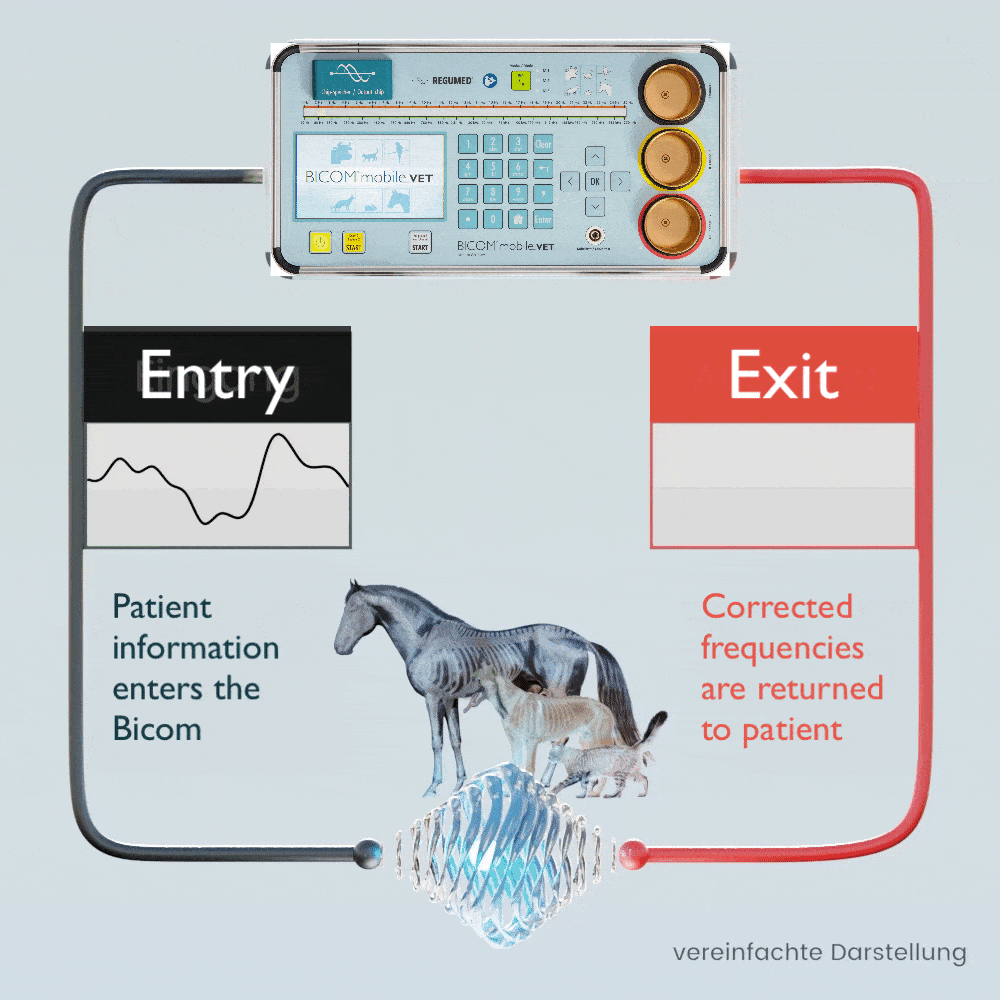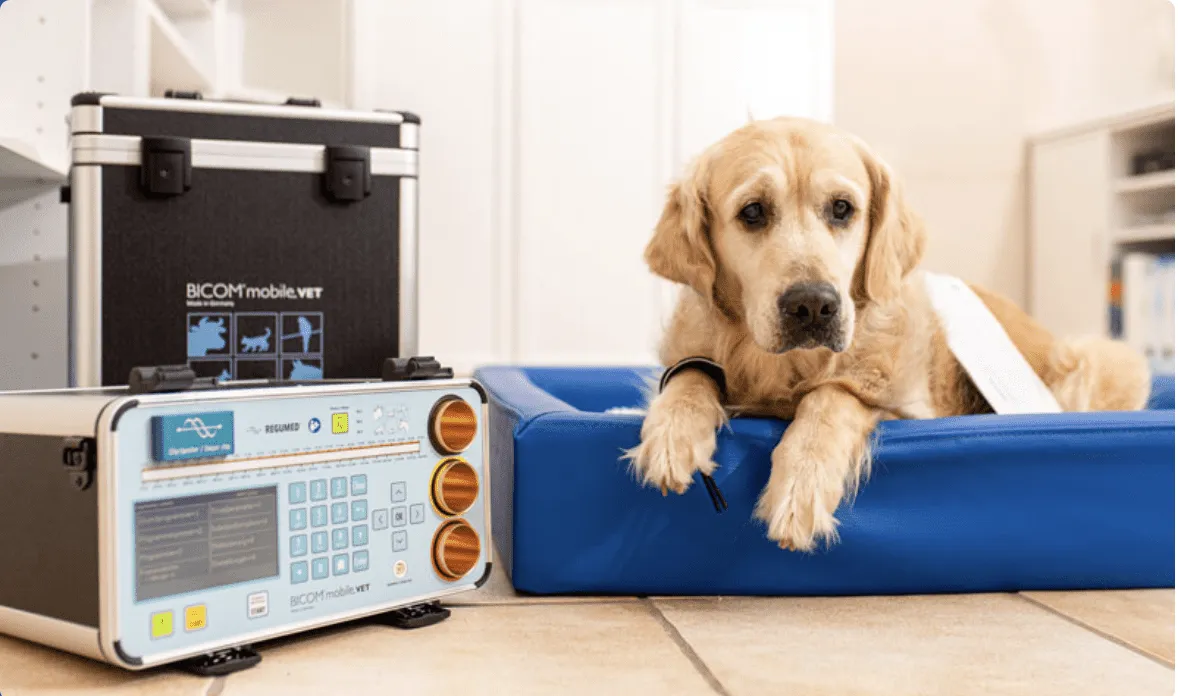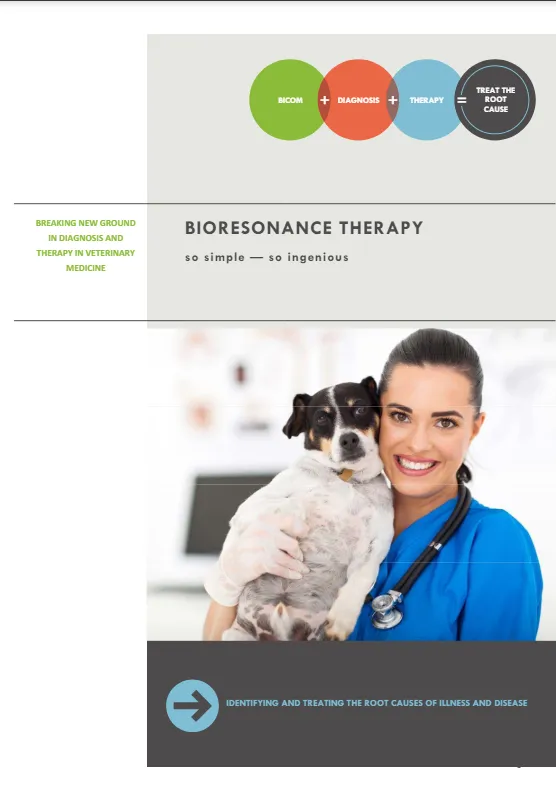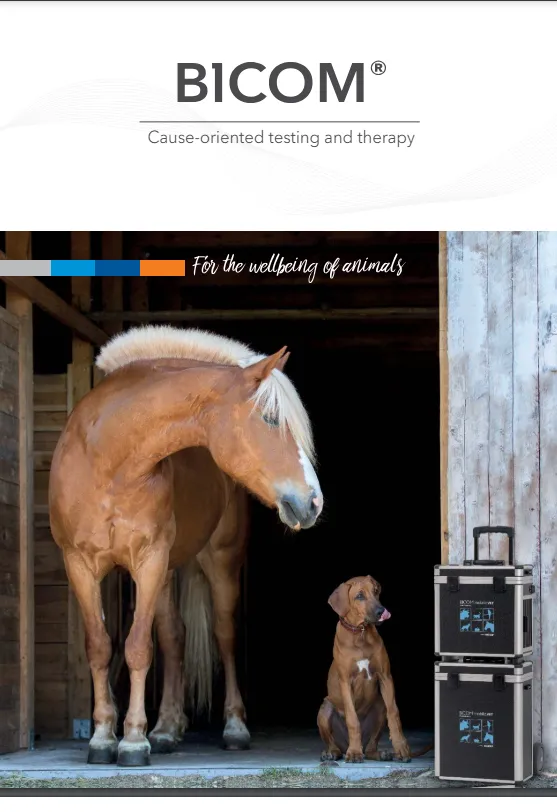Treatment with the help of the patient’s own information
in the BICOM® mobile VET bioresonance device
In contrast to other “frequency therapy devices”, BICOM® bioresonance is a method that is highly individual and perfectly tailored to the needs of the patient through the use of the patient’s own information and the possibility of testing specific wave patterns for resonance.
The patient’s own pathological and physiological information is recorded using special applicators and fed into the BICOM® mobile VET.
Depending on the therapy program, the specific wave pattern as a carrier of information is amplified, weakened or inverted and transmitted back to the patient in modulated form, which means that the transmission of information changes in clarity depending on the modulation or it disappears completely.
The treatment signals continuously adapt to the changing pathological situation of the patient. As the therapy progresses, the body’s ability to regulate is reactivated.
Find out more about this topic at our regular events. Together with veterinarians and animal naturopaths, we offer various face-to-face and online events .
The BICOM® bioresonance method is a cause-oriented, holistic treatment concept. It can narrow down the cause of the health problem in animals and find out even the hidden causes of the clinical picture.
Animals have a natural regulatory system that can also compensate for unusual influences. However, even good self-healing powers eventually reach their limits. Persistent exposure to allergens, environmental toxins, fungi, viruses, bacteria or stress and changed living conditions weaken the immune system and are often the cause of an illness. In particular, fungal infestation on the skin or chronic diseases in general are not always due to a breeding-related genetic defect, but are signs of a disturbed immune system.
The BICOM® bioresonance method is the key to successful diagnosis and therapy, especially for animals that cannot tell us exactly where it hurts or what the symptoms are. It is a gentle form of therapy that can be carried out without side effects and without additional stress for the animal.
The BICOM® mobile VET records the bioenergetic state of the animal, processes the information it contains and returns modified vibrations / therapy frequency patterns to the animal. Symptoms and stress can be diagnosed and targeted therapy can be initiated.
Through the use of endogenous and exogenous substances, the body’s own self-healing powers can be activated and imbalances that have existed for a long time can also be regulated.
REGUMED Medizintechnik are pioneers of the BICOM® bioresonance method. More than 30,000 therapists worldwide, well over 10,000 of them in Germany, successfully use their therapy concept.

Biophysical basics of the bioresonance method
Life is only possible when three conditions are met: matter, energy and information.
We also find these aspects in conventional medicine, both in diagnostics and in therapy. For example, every drug is also a carrier of information.
Information is neither energy nor matter, it is immaterial and comparable to the meaning of a message from a sending to a receiving system.
In addition to the electrical processes in the receptor proteins and biomembranes in general, electromagnetic interactions through light (biophotons) also play a role in cell communication and the transmission of information.
Specific electromagnetic wave patterns act as information carriers. These wave patterns can be modulated by the BICOM® device in order to eliminate disturbing or stressful information in an organism.
The goal is to restore the free flow of healing information (cell communication) and thus support the self-regulation of the organism and the self-healing powers.
Individual, patient-specific information or information from native substances, digitized substances or information stored on storage media can be used for therapy.
What your colleagues are saying…

Bioresonance And Allergic Rhinitis
Allergic Rhinitis, also commonly called hay fever, is an allergic reaction that the body experiences when exposed to particular types of allergens. The condition can be troublesome and have a considerable adverse impact on a person’s ability to perform certain day-to-day tasks, mostly due to the numerous symptoms that can be caused by the human body’s response after being exposed to a certain allergen. The symptoms that a person experiences after such exposure can vary from mild to more serious and intrusive symptoms. Some people experiences allergic rhinitis only at certain times of the year, while others have problems with the symptoms related to this condition during the entire year.
Types Of Allergic Rhinitis
Rhinitis is a term that refers to a wide variety of conditions. These can include infectious rhinitis, drug-induced rhinitis, hormonal rhinitis, occupational rhinitis and, what we want to focus on in this post, allergic rhinitis. Allergic rhinitis itself has also been divided into two different sections, and understanding these two types can help a particular individual experiencing the symptoms identify which type of allergic rhinitis they are suffering from. The American College of Allergy, Asthma & Immunology explains that up to 60 million people in the United States suffer from some type of allergic rhinitis. They continue to explain that the following are the two primary types of allergic rhinitis that can be diagnosed in a patient:
Seasonal Allergic Rhinitis – This particular type of allergic rhinitis is relatively self-explanatory – it refers to a patient who experiences the symptoms of allergic rhinitis at specific times of the year, usually when there is a change of season. These symptoms usually arise during spring and summer, as well as during the early weeks of fall.
Perennial Allergic Rhinitis – This type of allergic rhinitis refers to a condition where a person experiences the symptoms of this condition at all times – even when there is not a season change.
Symptoms Of Allergic Rhinitis
When a person develops allergic rhinitis and is exposed to a particular allergen to which their body has an allergic reaction to, then they can experience quite a large number of different symptoms. Not every person will experience the same symptoms or the same number of symptoms since each person’s response to a particular type of allergen will be different. Some will also experience more severe symptoms than another. According to Healthline, some common symptoms that people may experience when they develop allergic rhinitis include:
Runny or stuffy nose, as well as constantly sneezing. Their nose may also become itchy.
Coughing is relatively common as the allergic reaction may affect the respiratory tract.
Eyes may become itchy and watery. Dark circles may also develop underneath the eyes.
The throat may become scratchy or sore.
Headaches are also relatively common, especially with long-term exposure to allergens or when suddenly exposed to an excessive amount of allergens.
Allergic rhinitis also commonly causes excessive fatigue as a problematic symptom.
Some symptoms that are usually associated with eczema may also develop. This may include dry and itchy skin. Blisters can also develop on the skin.
Hives is another symptom that may be caused by allergic rhinitis.
It is important to note that, even though allergic rhinitis is commonly called hay fever, fever itself is not actually a symptom caused by this particular condition.
Bioresonance And Allergic Rhinitis
In the modern world, people are rather opting for alternative testing and treatment measures as opposed to visiting a doctor for a prescription of medication that may cause side-effects that could be unpleasant to them. Bioresonance therapy has become one of the most popular alternative forms of medicine in the world today. When a patient with allergic rhinitis utilizes bioresonance technology in seek of relief, they are able to obtain a complete overview of why they are experiencing the particular symptoms that are interfering with their daily lives.
Bioresonance therapy works by sending electromagnetic waves into the patient’s body. These waves have been pre-programmed to test the body’s response to certain allergens that may be causing the symptoms a particular patient is experiencing. The body then provides a feedback, also in the form of electromagnetic waves, to the bioresonance machine, which then interprets the body’s messages and delivers a complete report on what allergens need to be avoided for a relief of symptoms. Additionally, information regarding other sensitivities that might also be contributing to the symptoms can also be delivered through the use of a bioresonance machine.
Conclusion
Allergic rhinitis can cause numerous unpleasant symptoms, ranging from a runny or stuffy nose, to headaches that become present frequently. These symptoms can be problematic in a person’s day-to-day life, especially when paired with the excessive fatigue often experienced by patients who develop allergic rhinitis. With the use of bioresonance therapy, a complete analysis can be conducted to determine the particular allergens a person is experiencing allergic reactions to; thus providing the patient with a complete overview as to the particular allergens that need to be avoided in order to reduce both the frequency and the severity of the symptoms they are experiencing.
Treatment Priorities
For gentle and optimal treatment of the causes of diseases in animals
The BICOM® bioresonance method is predestined for use with large and farm animals such as horses , but also with dogs , cats and small animals. The treatment focus of the BICOM® mobile VET is wide-ranging. It is now used for many indications.
It recognises health deficits at an early stage and is used, among other things, for the following symptoms:
sweet itch
Feed intolerances
allergies and related diseases
COB/COPD
leishmaniasis
Lyme disease
anaplasmosis
lameness in horses
hoof ulcer
Poisoning by poisoned baits, plants etc.
mauke
Feline infectious peritonitis (FIP)
Cat flu/cat disease
eye/conjunctivitis
and much more
Get advice now!
Our experts are happy to be there for you personally
Our BICOM® bioresonance experts are available to answer any questions you may have
and will be happy to advise you personally and individually.




Request more information
Quick Links





Facebook
Instagram
Mail